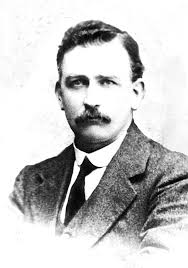October 19th, 1920 marked one of the most notorious incidents of British brutality in Galway during the Tan War era. Mícheál Breathnach (Michael Walsh), a republican Councillor in Galway city, was taken from the Old Malt House, the pub he ran, and shot dead by the notorious Black and Tans.
Although not a Volunteer himself, he made no attempt to hide his political ideals. Indeed, he once proposed at a council meeting that the idea of toll booths, which would be used to collect tolls from people bringing goods into the city, should be extended to include the docks.
The idea was that the council could levy any ships coming into the docks – including British Navy vessels. Unionist Councillor Joe Young protested, saying “Sure if that was the way, no British naval vessel would ever come into the docks, to which Breathnach replied “I rest my case,”
A prominent local republican, Breathnach more than played his part in the fight for the Irish Republic proclaimed in 1916. According to Geraldine Dillon (sister of executed 1916 leader Joseph Plunkett) in her witness account to the Free State Bureau of Military History, Breathnach was targeted due to “… his assistance to the Volunteers, the use of his farm in the country as a prison for prisoners of the Republican Courts, and Joyce’s letter, a copy of which must have gotten to the police in the end”.
‘Joyce’ was Padraig Joyce of Barna, a schoolteacher and informant for the British whose letters, in which he names local Volunteers, had been intercepted by the IRA.
Breathnach was the victim of harassment from the British before his murder. In the early hours of September 22nd, 1920, twelve Black and Tans burst into the Old Malt House pub, breaking the door in and rushing upstairs to where his wife, Agnes, and children were sleeping, and demanded to know of Mícheál’s whereabouts.
They then searched the building, firing shots and exploding grenades, causing extensive damage to the property. They also broke open the safe and stole its contents, as well as taking money from the till in the bar. Clothing, tobacco, beer and alcohol were also stolen during the raid. The taps were opened on barrels, and then the doors, cabinets and furniture was smashed. The damage was estimated to have cost 1,000 pounds.
Breathnach’s pub was raided again a month later, on the night of October 19th. Just before 10pm, he and his assistant, Martin Meenaghan, were serving customers in the pub. According to Martin:
“About three minutes to 10, five men wearing civilian clothes and waterproof coats and carrying revolvers in their hands entered the shop. Two of them wore soft hats pulled down over their faces and one wore something like a red handkerchief partly across his face. Speaking with English accents, they said it was time to close the shop. They ordered the people out and closed the door after them. They then went to the till and took all the money. They went to the cashbox and took whatever was in it. They went to the safe, which was broken the last time the house was raided, and took whatever was there. They also took cigarettes and other things including tobacco. I saw one of them putting a bottle of Oxo in his pocket. They told Mícheál that he would be dead within an hour and they denied him access to a priest. ‘You have shot a lot of police,’ one said, and Mícheál said, ‘If I was as free of everything as the shooting of police, I would be all right’.”
Four of them left with Breathnach and one stayed behind with Meenaghan. They brought him along the Long Walk, where they killed him with one shot into the temple, and then dumped his body in the river. His body was discovered the following morning and was brought to his house.
A plaque today marks the spot where Micheál Breathnach was murdered by British forces.
When the remains were removed to the Pro-Cathedral on the following Thursday evening, they were accompanied by an armoured car, a squadron of British Dragoon Guards, and a party of armed constabulary lined the main street to the funeral. The funeral itself was limited to the clergy and 50 people including relatives.
Military and police were stationed at the Pro-Cathedral and along the streets at several points, the Dragoon Guards with drawn sabres lining the way on either side along the route to the new cemetery. An armoured car also followed the funeral.
In the British parliament on October 21st, British ‘Chief Secretary for Ireland’, Hamar Greenwood, said: “There is no such force as the Auxiliary police in Galway or elsewhere in Ireland. There are members of the auxiliary division of the Royal Irish Constabulary. These men are all ex-officers, and I will not accept, except on the clearest and most conclusive proof, the allegation that any of these officers now serving in the auxiliary division are guilty of murder. Every effort is being made to ascertain the identity of the murderers.”
Then, as today, the British establishment refused to take responsibility for their barbaric actions. The people of Ireland today owe it to the memory of Mícheál Breathnach – and all those who have given their lives for their belief in an Irish Republic – to realise such a Republic, and to uncover the ugly truths about the nature of the British occupation in Ireland.


